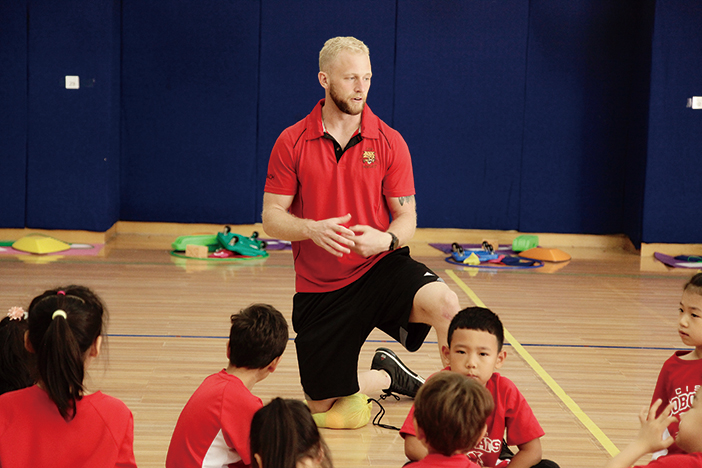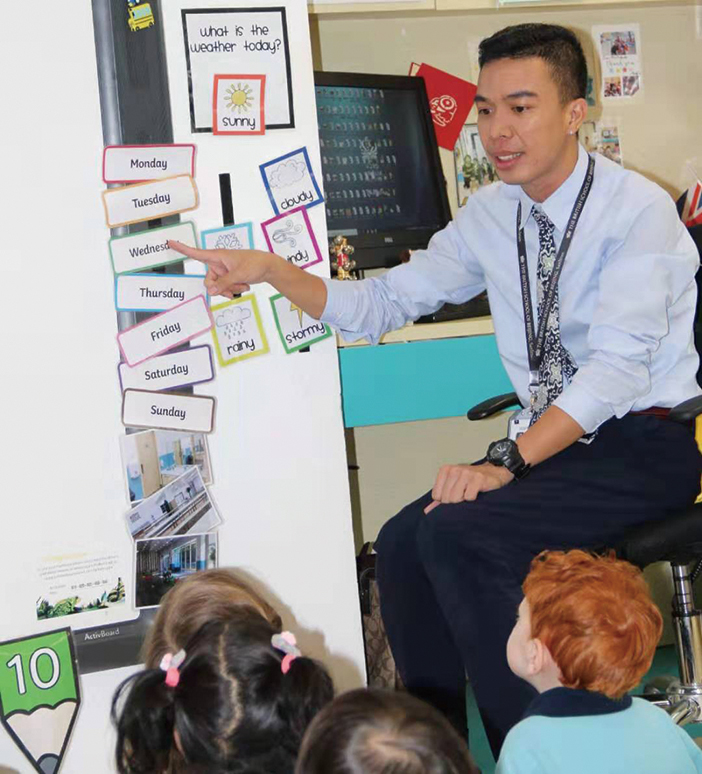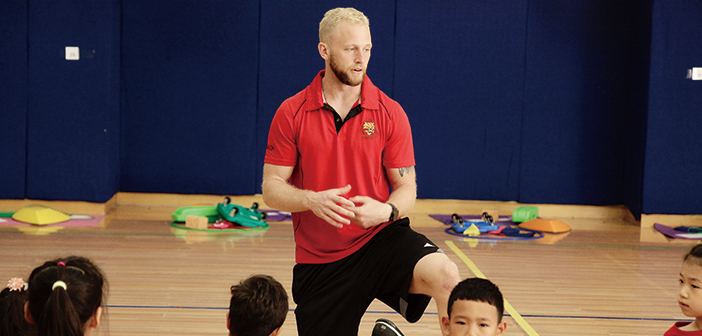When Orlando Basco Jr. was a child growing up in the Philippines, he was surrounded by five sisters and a large, close-knit extended family. One of the kids’ favorite activities was playing school, and Basco Jr. relished those days that he got to act out the role of teacher. Even after they had aged past the fun of make-believe, his sisters had brought new children into the world and, still fondly remembering those times from his youth, Basco Jr. reopened the ‘classroom’ for his nieces and nephews. So when it came time to choose a career, early childhood education (ECE) seemed like a natural fit.
“Back then I knew I had that potential to be a teacher,” Basco Jr. tells beijingkids. “I grew up in a big family back home and I always loved being surrounded by the children because of their energy. They’re full of life and that’s very contagious for me.”
However no amount of make-believe could have prepared Basco Jr. for the rewards that he would reap from a life in the classroom. It wasn’t until six years ago, when he started working as an early-years and pre-nursery practitioner at the British School of Beijing, Sanlitun (BSB Sanlitun) that he realized what the full impact of working with kids would be.
“Teaching is always a mutual process between the children and me,” Basco Jr. says. “They learn from me, and without a doubt I learn from them, tremendously. I’ve learned how to be mindful about their emotions, because you never know what to expect with children. Sometimes there’s better days and sometimes there’s not, so I take cues according to their energy levels, and I make sure I try my very best to work on their well-being.”
 In speaking with Basco Jr., it’s clear that he has both a sincere passion and true knack for working with young minds. As it happens though, his gender puts him in the minority of a sector that has long been dominated by females.
In speaking with Basco Jr., it’s clear that he has both a sincere passion and true knack for working with young minds. As it happens though, his gender puts him in the minority of a sector that has long been dominated by females.
When most people think of an elementary school teacher, they imagine a soft-spoken, rosy-cheeked woman standing in front of a blackboard, picture book in hand, leading the students in a lesson about colors, animals, or the alphabet. And generally speaking, this image is spot on. A cursory dive into the statistics surrounding early childhood educators reveals a dearth of male teachers, worldwide.
In fact, according to figures from China’s Ministry of Education, in 2017 there were about 2.43 million kindergarten teachers across the country, of which roughly two percent were male. Likewise, according to the Bureau of Labor Statistics, among the 1.57 million kindergarten and elementary school teachers working in the United States in 2018, male employment also hovered around two percent. And across Europe, the numbers fluctuate between one and three percent.
These are numbers that Basco Jr. himself can attest to. “From my primary years all the way through university, most staff were women. And most people would think that this job is meant for women, because they have more of a maternal instinct. But for me teaching is not just a job, it’s a passion, and I’ve never been clearer about what I wanted to do.”
It’s interesting to note that in recent years, global conversations have focused on empowering women to take up roles in those spaces that have historically been occupied by men, and for good reason. Just about every industry and locus of power, from technology to business and entertainment to finance, has been a virtual ‘boys club,’ either completely off-limits to women, or extremely difficult for them to break into.
And while these conversations are long overdue, there’s a flip side to it that is not being discussed as much; that is, the role of men in fields that have traditionally been dominated by women. Various careers such as flight attendant and nurse have generally been the domain of women, and men who wished to enter these spaces have faced their own uphill battles fraught with prejudice and discrimination.
It’s clear that the same double standards which preclude women from climbing the corporate ladder also keep men from pursuing careers in elementary education. Whereas women are seen as being too compassionate, nurturing, or emotional to lead a high-powered business team, men are seen as too brusque, pragmatic, and logical to lead a classroom of young learners. Ultimately, what history and society tells us is that men and women possess different qualities, and thus they can only excel in different positions.
Writing in Compare: A Journal of Comparative and International Education, researchers Yuwei Xu and Manjula Waniganayake published an article titled, “An Exploratory Study of Gender and Male Teachers in Early Childhood Education and Care Centers in China.” Their report sheds light on both the societal and internal feedback loops that operate outside of and within men, two forces that effectively stop them from entering ECE. On surveying early childhood education centers (ECEC) in China specifically, they summarized their findings as such:
 “Reflecting the globally recognized historical construction of ECEC as a ‘feminized’ job…employment in ECEC centers in China has also long been regarded as a woman’s occupation, making a career as an Early Childhood Teacher (ECT) an unattractive option for men. More importantly, Chinese society still sees men as the main breadwinners of families, and the low wages paid to ECTs is a significant reason preventing men from seeking a career in the ECEC sector.”
“Reflecting the globally recognized historical construction of ECEC as a ‘feminized’ job…employment in ECEC centers in China has also long been regarded as a woman’s occupation, making a career as an Early Childhood Teacher (ECT) an unattractive option for men. More importantly, Chinese society still sees men as the main breadwinners of families, and the low wages paid to ECTs is a significant reason preventing men from seeking a career in the ECEC sector.”
Similarly, speaking to Margaret Paton at GetEduca.com, Dr. Martyn Mills-Bayne, an ECE lecturer at the University of South Australia boils down the lack of men in the field to two main factors; “it’s women’s work and men are not ‘designed to work with young children,’ and the breadwinner argument, meaning men can’t afford to earn as little as the sector pays.” All of which suggests that these gender imbalances are truly a global issue.
Nevertheless, despite the stigmatization and social pressures that he could’ve faced going into ECE, Basco Jr. knew there was no other job for him. “I don’t want to put any label on who is better regarding teaching and education, because I think you can be anything you want to. If you’re very passionate and determined with your goals and aspirations in life, then you can represent your individuality in any field.”
Thanks to men like Basco Jr. and others, the perception of what an early years teacher should be is changing, and future generations will undoubtedly be better for it. Ilich Granados is the Kindergarten Integrated Specialist and Enrichment Activities Team Leader at Beijing City International School (BCIS), and he believes that a gender balance in ECEs is an integral part of a child’s development.
“In my opinion, having a balance of role models in the early years centers allow children to develop a better understanding of who they are and who they want to be,” says Granados. “Children begin to see patterns of behaviors in adults around them, and they start to adopt these behaviors based on their identity.”
At the same time, he understands that being a man in a field otherwise devoid of them does require a bit of contextualizing. “I see myself as a teacher who is trying to create fun, meaningful, and lifelong learning experiences for my students. However, as one of the few male role models in the school, I also think that I have the responsibility of showing that men can be nurturing and caring.”
And it would seem as though BCIS and its parents agree. According to Granados, “I have been lucky to be surrounded by supportive and encouraging colleagues. Thankfully, I have never experienced any pushback or negative responses from anyone. On the contrary, I have felt that the parents at the [early childhood center]appreciate having me as their children’s teacher.”
Within the realm of ECE, one area that has been reserved for men is the physical education department. The world over, men are regarded as being more sporty, brave, and strong. While on some level, these stereotypes are beginning to wane, they have long been a pervasive force in elementary schools. Even still, as the tides of modernity continue to change, so too has the awareness that men carry with them as they navigate social and professional spaces.
As the PE teacher for kindergarten through grade two and Elementary Athletic Director at the Canadian International School of Beijing (CISB), Matthew Thompson takes care to be mindful of those traits that are traditionally associated with masculinity.
“I feel like being a male kind of has a connotation of being a little more stiff in a teaching environment, almost not welcoming,” says Thompson. “It’s just building those relationships at a young age so they know male educators are approachable as well, it’s not just a female field.”
Even in the gym or on the pitch, where a man could get away with being a bit more gruff, Thompson deeply understands the lasting effects he can have on his students. “I try to watch my tone of voice, certainly. And body language is everything. So if a kid is doing something, and it’s not the expectation I have, I’ve caught myself and gotten upset with myself when I take that deep breath in front of the kid or roll my eyes, doing any of that body language that is dismissive. So I’m very conscious of that and I try not to.”
All of this is reminiscent of Thompson’s own time in grade school, which he remembers as being ruled by adults that were steeped in rigor and inflexibility. Even then, he understood that the best way to inspire and nurture children was to leave room for failure and let them learn from those mistakes. What’s more, this disillusionment, or realization that something in the system wasn’t working, is what led him to pursue a career in ECE.
“When I was a junior or senior I felt that things were very rigid, and that people were dealing with very direct instruction with kids, not letting them explore or come to their own conclusions, I felt like that was a very real thing,” Thompson remembers. “And I was like, okay, this is a place where I could actually create some change.”
And at CISB, he’s found an infrastructure, support system, and leadership team that feels the same way. “We are an IB school, so that allows for a lot of inquisition and open-ended questions, and giving the kids an opportunity to explore, collaborate, and come to their own conclusions. When I talk about people being very rigid, everybody wants to move so fast cause they have the next expectation to meet, and that’s not what’s best for kids or for learning.”
Whereas most people would think of the PE department as a place for developing motor skills and a time for kids to run around and expend some energy in the middle of a school day, Thompson understands there’s a lot more to be learned on the court, or sometimes, when a kid storms off it.
Aware that his frustration will in turn frustrate his students, especially if they’re failing to grasp a certain lesson, Thompson brings it back to those traits that are generally associated with uncaring, cold, and calculating machismo. “This is that old style of PE, the male rigidity, if you just yell at a student [who’s walking off the court], and say ‘hey come back here or else you’re gonna get a zero,’ the kid’s never gonna respond to that. So when a kid gets upset like that, it’s giving them the opportunity to be upset. It is developmentally appropriate to be upset if you can’t do something. The trick is when we can’t do something, we ask how we can come at it from a different approach, and do better in the future.”
When you strip away all the sports equipment and lessons though, Thompson sees himself as a role model and a caretaker more than anything else, both for boys and girls. “At this young age, and with mental health globally right now, it is letting them know they’re safe and that being a man is not a rigid thing.”
Photos: provided by schools
 This article appeared in the beijingkids November 2019 Beijing Baba issue
This article appeared in the beijingkids November 2019 Beijing Baba issue




